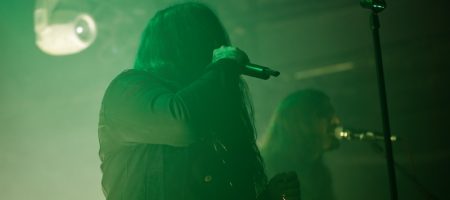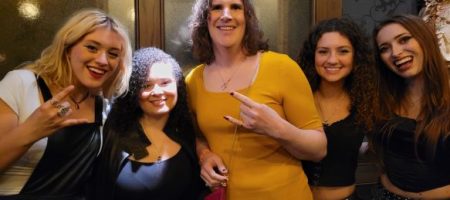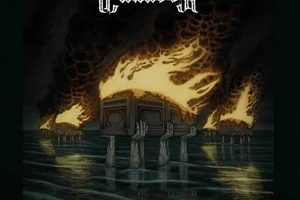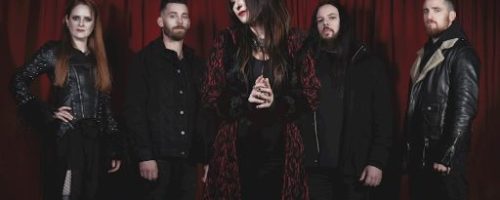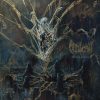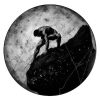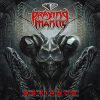Katatonia – Shape Shifters
Sunday, 31st July 2016The 25 years/10 album milestone has done little to alter Katatonia’s course. The Swedes—like any good band—remain in a state of constant evolution, unwilling to take the ‘ol “return to form” plunge like so many of their peers. It’s a catch-22, though. Every time you climb the sonic ladder, the bottom rungs become further in the distance (see: Brave Murder Day), eliciting cries from the old guard that things aren’t what they used to be. Of course they aren’t. Katatonia isn’t the same band they were five, ten, or certainly twenty years ago.
Their new The Fall of Hearts (Peaceville) is another forward plunge through the dark progressive rock/metal arena, a moody (“Shifts,” “Pale Flag”), heavy (“Serein,” “Sanction”) and challenging (“Serac,” “Passer”) body of work that gets better with each successive listen. It strong-arms 2012’s minimalistic Dead End Kings while matching the depressive aura of Night is the New Day and throttling heaviness of The Great Cold Distance. Moreover, it firmly upholds the progressive spirit Katatonia has been so prone to labeling themselves with.
With our assessment and quasi fan-boyish musings out of the way, here’s vocalist Jonas Renkse gabbing it up with us via email on a variety of topics. Read on…
Dead Rhetoric: In doing not only Dethroned and Uncrowned, but Sanctitude, what did you learn about the band in such different environs?
Jonas Renkse: A lot of things about those two releases were eye-openers, even in the smallest details. Perhaps mostly a general sense of “musicality” that we hadn’t explored fully before doing those projects. The ability to lean back and trust the songs, the foundations. Not just compensate with layers and volume.
Dead Rhetoric: In turn, what has been the most rewarding aspect in doing a “different” version of Katatonia?
Renkse: To learn these things and take it with us when moving further down the road.
Dead Rhetoric: The metal and rock scene has become more homogenized with every passing year. Does this sort of increase the importance of maintaining your own identity?
Renkse: I think so, and it should be for every band that wants to stay “interesting”. It’s not something we think lf too much or even plan, but of course you want to be the cream of the crap, haha!
Dead Rhetoric: To you, what does the term “progressive” represent?
Renkse: To me it represents something that wants to move forward and think outside the box. Difficult and/or unusual time signatures are not progressive by themselves, but if they are put into a context where the person using them wants to do something different and achieve a special result, then it becomes progressive because of the act rather than the drum beat/whatever itself. A choir can be progressive by using a different approach to singing, I guess. The process of erasing limits.
Dead Rhetoric: The band now has ten albums to its credits. Going into The Fall of Hearts, was the general consensus to do something a little different, and not repeat yourselves?
Renkse: That’s always our goal. Of course we WILL repeat ourselves to a certain extent, because we have crafted a sound that we are very comfortable with. So it’s deliberate then. But whenever there is an opening where we can push the limits, we will do it. Maybe more than ever on The Fall of Hearts… we were definitely out of our comfort zone at some points, which is good!
Dead Rhetoric: Indeed the songs have a tremendous amount of variety. But, if there’s one song you could point to as being “the one” on The Fall of Hearts, what would be it? “Serein?” “Old Heart Falls?” Or maybe even “Shifts?”
Renkse: That’s really hard to say… “Old Heart Falls” is definitely A LOT of Katatonia. But the album represents variety, so maybe “Serac”? Or “Takeover”, those songs are like mini-versions of the album itself to me.
Dead Rhetoric: Daniel Moilanen has proven himself quite nicely on the new album. Can you describe the difference in working with him versus Daniel Liljekvist?
Renkse: Yes, I think that Daniel Moilanen have proven himself to be a perfect drummer for Katatonia, just like Daniel Liljekvist was. Both are very responsive drummers and musicians. I would say that the main difference between them is that Daniel L. is a very emotionally driven drummer, he needs his special zone and when he is there he can play anything. Daniel M. is a drummer that loves a challenge, if I would throw him an idea that is practically impossible to play, he will be able to play it without a doubt. And both Daniels are lovely people, which I think is perhaps the most important thing.
Dead Rhetoric: You’ve always been so prolific with b-sides, and the new album is no exception. Was it difficult to pick and choose which songs would end up on the album?
Renkse: Not really, this time we pretty much knew beforehand which songs would end up as b-sides/bonus songs. And they have not been treated as less important because of that. Maybe the other way around, actually, since we know we have a reputation to put out prolific b-sides, ha-ha.
Dead Rhetoric: Moving along, you have plans to celebrate the 10-year anniversary of The Great Cold Distance this year. It’s really a turning point album for the band, but what are your fondest memories of recording it?
Renkse: True, it has proven to be a very important album for us. I remember being really happy to be working with Jens (Bogren) for the whole recording process as he just did the mix on the previous album, Viva Emptiness. He managed to bring forth the best in our performances. Overall we had a really good vibe in the band by the time of recording it.
Dead Rhetoric: Performing with a full orchestra for the anniversary show…a daunting task, or something you already have under control?
Renkse: Daunting for sure! Never done anything like it before, and probably never will after this one… but I surely look forward to it. Our music is taking us to places and is giving us opportunities that I could never dream of… I try to go with the flow and just enjoy the ride.
Dead Rhetoric: You’ve never shied away from coming over here to America to tour. Will that also be the case for The Fall of Hearts?
Renkse: Definitely, it’s a favorite place for me to tour so I can’t wait to come back. Early 2017 would be my guess since we have a full schedule for 2016 already.
Dead Rhetoric: Finally, what’s on the agenda for the rest of 2016?
Renkse: Doing a few more summer festivals here in Europe, then we start the real touring cycle for The Fall of Hearts in late August, doing a Latin American tour, after that it’s Bulgaria with the orchestra and then a long Euro tour which stretches into November and then we’re going to Australia in December!












